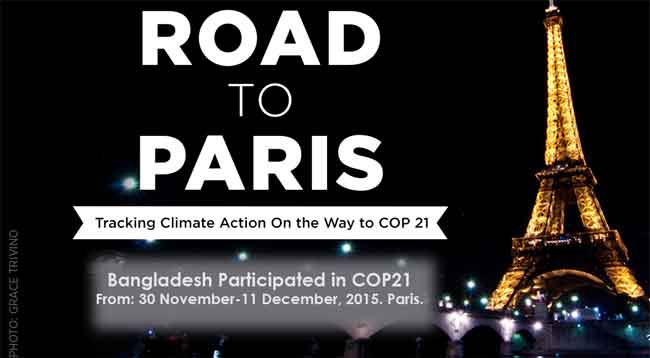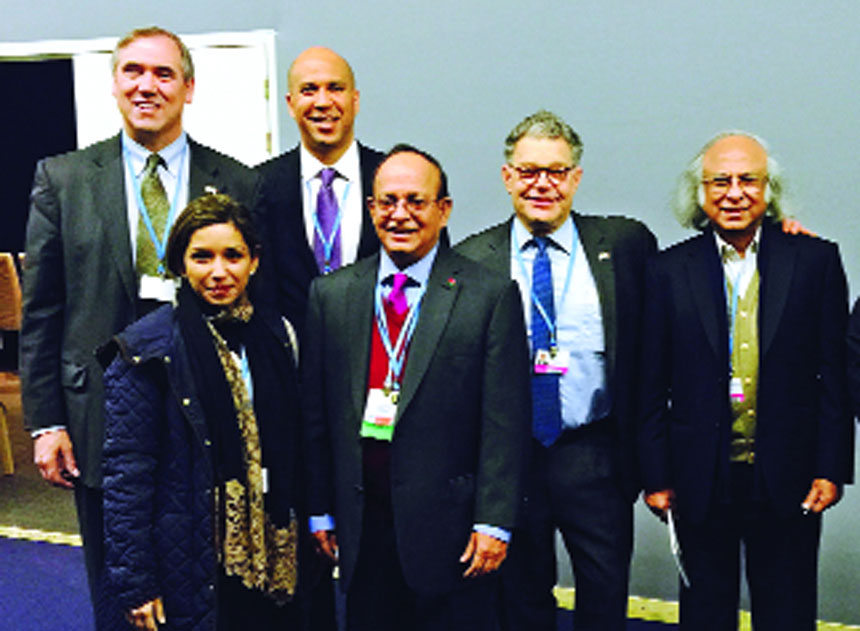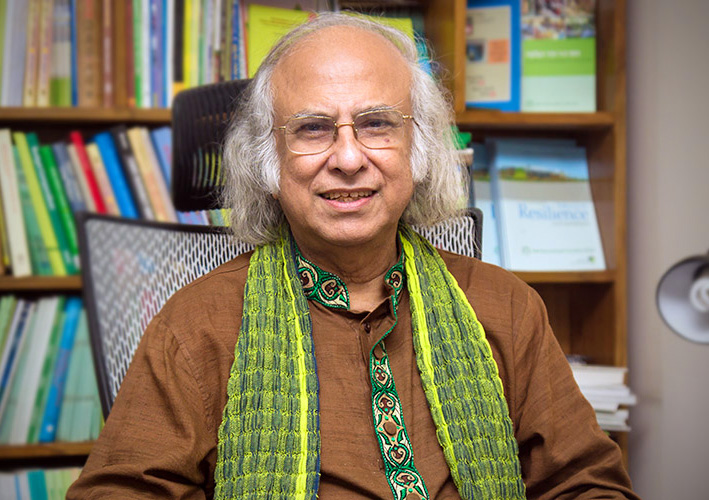News Title: ‘Fighting commodification of climate change aid’
Date: 03 Dec, 2015. Publisher: Dhaka Tribune (Bangladeshi Daily English News Paper)
Qazi Kholiquzzaman Ahmad and Dr Hasan Mahmud, members of Bangladesh delegation to COP21, discuss with Sohara Mehroze Shachi what the country hopes to achieve in Paris
Q: How does Prime Minister Sheikh Hasina’s decision to not attend COP21 impact the country and the delegation?
Mahmud: The prime minister could not attend COP due to pressing political issues in the country and security concerns. However, it does not tarnish our image in any way as it is widely acknowledged that Bangladesh has taken many significant initiatives to combat climate change under Sheikh Hasina’s leadership. As a testament to her efforts she was also awarded the Champions of the Earth Award this year. Moreover, the COP president mentioned our prime minister in the opening remarks, so I believe Bangladesh is and will be strongly visible at COP21.
Q: What are Bangaldesh’s key demands from COP 21 and how well-equipped is the delegation this year to push for its demands?
Mahmud: The delegation this year is much better equipped than in previous years and much better prepared. With this team we are expecting to strongly advocate for equitable distribution of resources to combat climate change.
Kholiquzzaman: Everyone in the delegation is a specialist in their area. We have already determined a clear set of objectives. Our target is to attain a legally binding treaty as Bangladesh is highly at risk from climate change. This is the time to bring things under control, otherwise it will be too late. Greenhouse gas emissions have to be significantly decreased so that the temperature rise is less than 1.5 degrees Celsius by the end of the century.
Q: Tell us about Bangladesh’s Intended Nationally Determined Contributions (INDCs).
Kholiquzzaman: Although we emit 0.3 tonnes of greenhouse gases per capita per annum, which is one sixth of the average of developing country emissions, to be in harmony with the world we have committed to reducing emissions by 5% in three crucial sectors – transport, power and energy. If there is technical and financial assistance we can go up to 15% reduction by 2030. We have committed to not let our emissions go above the average of the developing countries.
Mahmud: We have also highlighted the adaptation needs of Bangladesh because people are suffering in the coastal areas and throughout rural Bangladesh.
Q: What is Bangladesh’s position regarding climate finance?
Mahmud: We need official assistance for adaptation. This must be additional, new and all grants, not loans. There is talk of assistance coming in the form of soft loans – we oppose that. There is a tendency to commodify everything by the capitalist countries and even healthcare has been commodified. We are fighting to ensure that climate change assistance isn’t as well.
Kholiquzzaman: Access to funding is essential because for technology transfer and financial transfer the institutional framework is there, but the money is not. One of the things that has to be clearly stated is the MRVs, Measurement, Reporting and Verification – particularly for finance.
Q: With regard to the Green Climate Fund (GCF), what are Bangladesh’s expectations?
Kholiquzzaman: There has been some talk lately of abolishing existing climate funding sources to make GCF the sole source. We oppose this because we believe the GCF should not replace existing funds such as Adaptation Fund and LDCF Fund – but should rather supplement them. These existing funds are dedicated funds, GCF is not, so it is important they remain active.
Mahmud: GCF funding should be more easily accessible for Bangladesh, especially since there has been a clear demonstration that we are not sitting idle and we are already funding a majority of our own adaptation projects in spite of being the victims of climate change.
Q: Are you hopeful about COP21 being different from past climate conferences?
Mahmud: The highest number of heads of state have gathered at this COP and that has given a new stature to COP21. While the agreement will not be a panacea, we are hopeful that this time there is a higher chance of promises being translated into action.
Hasan Mahmud is the chairman of the parliamentary standing committee on the Ministry of Environment and Forests, and is a former environment minister. Qazi Kholiquzzaman Ahmad is a leading Bangladeshi economist, environmentalist and activist. He was also the Coordinating Lead Author and Lead Author respectively of the third and fourth assessments of the Intergovernmental Panel on Climate Change (IPCC) 1.5% target for Bangladesh.
Source: http://www.dhakatribune.com/environment/2015/dec/03/fighting-commodification-climate-change-aid



